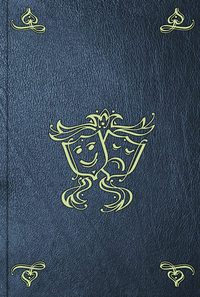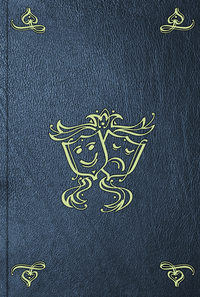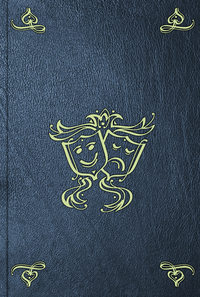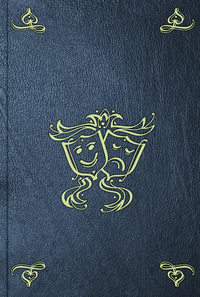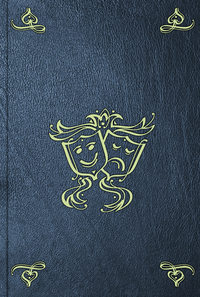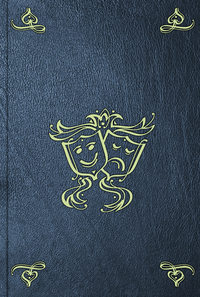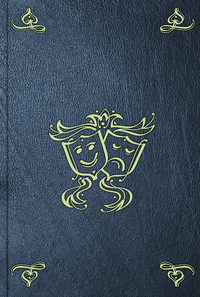
Полная версия
Sejanus: His Fall


Titel: Sejanus: His Fall
von Oliver Goldsmith, Samuel Pepys, William Dean Howells, John Burroughs, William Harmon Norton, L. Mühlbach, Franklin Knight Lane, Walter Pater, Jonathan Swift, Augusta J. Evans, Trumbull White, Kathleen Thompson Norris, Matthew Arnold, Charles W. Colby, Shakespeare, James Fenimore Cooper, D. H. Lawrence, James Joyce, Ada Cambridge, Philip E. Muskett, Catherine Helen Spence, Rolf Boldrewood, Ernest Scott, Fergus Hume, H. G. Wells, Victor [pseud.] Appleton, Roald Amundsen, Max Simon Nordau, Henry David Thoreau, E. Phillips Oppenheim, Richard Wagner, Franz Liszt, Charlotte Mary Yonge, Charles Henry Eden, Charles Babbage, T. R. Malthus, Unknown, Joseph Ernest Morris, Robert Southey, Isabella L. Bird, Charles James Fox, Thomas Hariot, Cyrus Thomas, Bart Haley, Christopher Morley, Edgar Saltus, Marie Corelli, Edmund Lester Pearson, Robert Browning, John Aubrey, Benjamin Nathaniel Bogue, John McElroy, John Galsworthy, Henry James, Hamilton Wright Mabie, Mina Benson Hubbard, Elizabeth Cleghorn Gaskell, John Keble, Henry Lindlahr, Richard Henry Dana, Annie Wood Besant, Immanuel Kant, John Habberton, Baron Edward John Moreton Drax Plunkett Dunsany, T. B. Ray, Isabel Ecclestone Mackay, Frank C. Haddock, William John Locke, baron Arthur Léon Imbert de Saint-Amand, Ralph Centennius, United States, Library of Congress. Copyright Office, James Otis, George Hartmann, Sir Arthur Conan Doyle, George Gissing, John Henry Tilden, Thomas Wright, Frederick Samuel Dellenbaugh, Anonymous, J. Clontz, David Hume, Margot Asquith, Elmer Ulysses Hoenshel, Byron J. Rees, Lida B. McMurry, Georges Duhamel, Ramsay Muir, Edith Wharton, Charles Sturt, Lola Ridge, J. M. Stone, Annie Payson Call, Grant Allen, kniaz Petr Alekseevich Kropotkin, Steve Solomon, Isabel Moser, Aleksandr Sergeevich Pushkin, Horace W. C. Newte, Charles Darwin, Maurice Maeterlinck, Walter Bagehot, Henri Bergson, George Randolph Chester, John S. C. Abbott, L. Frank Baum, William T. Sherman, Philip Henry Sheridan, Friedrich Wilhelm Nietzsche, Ambrose Bierce, Ulysses S. Grant, F. Scott Fitzgerald, Alfred Lichtenstein, Abbot of Nogent-sous-Coucy Guibert, Nellie L. McClung, Alice Caldwell Hegan Rice, E. Nesbit, Henri Barbusse, J. M. Synge, Frank Norris, Louis Hémon, Henry Van Dyke, Thomas Guthrie Marquis, Susanna Moodie, Frank Bigelow Tarbell, René Descartes, Kirk Munroe, Francis Hopkinson Smith, Edna St. Vincent Millay, Talbot Mundy, George Meredith, Clemens Brentano, James De Mille, James Allen, Norman Douglas, Bolton Hall, Arthur Christopher Benson, James Oliver Curwood, Frank Jardine, Bertram Lenox Simpson, Freiherr von Justus Liebig, Cyril G. Hopkins, Mary Eleanor Wilkins Freeman, Evelyn Scott, Charles Monroe Sheldon, George Berkeley, Steven Sills, Sara Jeannette Duncan, Jules Verne, Irvin S. Cobb, Zane Grey, August von Kotzebue, John Addington Symonds, Marjorie Allen Seiffert, J. B. Bury, William Makepeace Thackeray, Jules Renard, Susan Coolidge, Huguette Bertrand, Mrs. C. F. Fraser, Ottilie A. Liljencrantz, William Morton Payne, Henry Adams, T. S. Arthur, Orison Swett Marden, T. S. Ackland, Anthony Trollope, graf Leo Tolstoy, Robert Smythe Hichens, Émile Gaboriau, Wilkie Collins, Charles Reade, Horace Walpole, Jennette Lee, Thomas Dykes Beasley, Inez Haynes Gillmore, L. H. Woolley, John Francis Davis, James B. Stetson, William Day Simonds, James O'Meara, Almira Bailey, Cuthbert Bede, Voltaire, Percy Bysshe Shelley, William Bennett Munro, Sir Richard Francis Burton, Horatio Alger, Paul Verlaine, Samuel Vaknin, William Ralph Inge, Madame de Staël, J. Hector St. John de Crèvecoeur, L. A. Abbott, F. Colburn Adams, John S. Adams, Thornton W. Burgess, Glenn D. Bradley, Eugen Neuhaus, Arthur E. Knights, Bret Harte, Maturin Murray Ballou, Jane G. Austin, Samuel Johnson, Frederick Niecks, Stephen Leacock, Suelette Dreyfus, Stéphane Mallarmé, Lyndon Orr, William Le Queux, Mary Wollstonecraft Shelley, Jeannie Gunn, Jean François Regnard, John Ruskin, A. I. Kuprin, Pierre Louÿs, George Barr McCutcheon, John Munro, Holman Day, William Stearns Davis, John Richardson, Mary Jane Holmes, Oliver Wendell Holmes, Finley Peter Dunne, C. J. Dennis, Ethel Sybil Turner, Julius Wellhausen, Arnold Bennett, Harold Bell Wright, Guðmundur Kamban, Charles Stuart Calverley, A. E. W. Mason, Charles Rivière Dufresny, David Starr Jordan, Wallace Irwin, J. W. Wright, Thomas Hardy, United States Rubber Company, Helen Reimensnyder Martin, William Fayette Fox, Lewis Carroll, Anna Katharine Green, Shell Union Oil Corporation, Louisa May Alcott, Theocritus, of Phlossa near Smyrna Bion, Moschus, Bertrand Russell, Guy de Maupassant, Henrik Ibsen, James Whitcomb Riley, Josephine Lawrence, Pierre Loti, Harry Alverson Franck, Albert Payson Terhune, Harold MacGrath, G. A. Henty, Harriet A. Adams, John Lothrop Motley, H. E. Bird, Joseph Crosby Lincoln, Michel Baron, Gene Stratton-Porter, James Clerk Maxwell, Norman Lindsay, Edward Lasker, Margaret Penrose, S. R. Crockett, Austin Hall, Homer Eon Flint, Various, Clarence Edward Mulford, Upton Sinclair, John Andreas Widtsoe, Thomas Bulfinch, David Graham Phillips, John Kendrick Bangs, Edmond Jaloux, Emile Littré, 13th cent. de Boron Robert, Samuel Butler, James Huneker, Jessie Graham [pseud.] Flower, St. George Rathborne, Charles Wesley Emerson, Winston Churchill, Edith Bancroft, Lloyd Osbourne, Jack London, Lyman Abbott, Belle K. Abbott, Sinclair Lewis, H. W. Conn, Ludwig Thoma, Sir Walter Scott, August Strindberg, Thomas Chapais, Ernest Giles, David Wynford Carnegie, Zoeth Skinner Eldredge, Eusebius Joseph Molera, C. C. Andrews, Robert Barr, John Hendricks Bechtel, Robert W. Chambers, Alice B. Emerson, Anna M. Galbraith, Laura Lee Hope, L. T. Meade, Harry Steele Morrison, Frank Gee Patchin, Louise Clarke Pyrnelle, William MacLeod Raine, Roy Rockwood, Edward Stratemeyer, Louis Tracy, Matthew White, Leonardo da Vinci, Albert Einstein, Clarence Young, Ludwig Leichhardt, Arthur B. Reeve, Mrs. Georgie Sheldon, Samuel Hopkins Adams, George Washington, John Adams, Thomas Jefferson, James Madison, James Monroe, John Quincy Adams, Andrew Jackson, Martin Van Buren, John Tyler, James K. Polk, Zachary Taylor, Millard Fillmore, Franklin Pierce, James Buchanan, Abraham Lincoln, Andrew Johnson, Rutherford Birchard Hayes, Chester Alan Arthur, Grover Cleveland, Benjamin Harrison, William McKinley, Theodore Roosevelt, William H. Taft, Woodrow Wilson, Warren G. Harding, Calvin Coolidge, Herbert Hoover, Franklin Delano Roosevelt, Harry S. Truman, Dwight D. Eisenhower, John F. Kennedy, Lyndon B. Johnson, Richard M. Nixon, Gerald R. Ford, Jimmy Carter, Ronald Reagan, George Bush, William Jefferson Clinton, George W. Bush, United States. Presidents., Bjørnstjerne Bjørnson, Rex Ellingwood Beach, Euripides, Henry C. Northam, Mary Raymond Shipman Andrews, Alice Brown, Mary Stewart Doubleday Cutting, Elizabeth Garver Jordan, Elizabeth Stuart Phelps, Mary Heaton Vorse, Edith Wyatt, Bernard Shaw, Georg Büchner, Mrs. Alfred Gatty, Henry Mackenzie, Thomas Henry Huxley, Leonard Huxley, William Hazlitt, Arthur William Dunn, Baroness Emmuska Orczy Orczy, Standish O'Grady, J. M. Barrie, J. G Patterson, Alexandre Dumas père, Alphonse Daudet, Ignatius Donnelly, Henry A. Shute, Walter Savage Landor, E. J. Banfield, George Sand, Gustave Flaubert, William James, Charles Klein, J. Storer Clouston, John Fox, John Stuart Mill, Laurence Hope, Andrew Lang, Vaughan Kester, Molière, Baron George Gordon Byron Byron, Viscount Henry St. John Bolingbroke, Ben Jonson, Émile Zola, Thomas Stevens, Carl Ewald, Anatole France, Edward J. Wickson, Henry M. Stanley, Nicolas Boileau Despréaux, Selma Lagerlöf, Richard Marsh, W. B. Yeats, Ella Wheeler Wilcox, Henry Stevens, Gouverneur Morris, Kaiten Nukariya, Henry Rider Haggard, Frances Boyd Calhoun, George Crabbe, Bertram Waldrom Matz, Joseph A. Altsheler, Petronius Arbiter, F. Marion Crawford
ISBN 978-3-7429-5070-3
Alle Rechte vorbehalten.
Es ist ohne vorherige schriftliche Erlaubnis nicht gestattet, dieses Werk im Ganzen oder in Teilen zu vervielfältigen oder zu veröffentlichen.
SEJANUS: HIS FALL
By Ben Jonson
Transcriber's note: This play is based on events that happened a millennium and a half before Jonson wrote it. Jonson added 247 scholarly footnotes to this play; all were in Latin (except for a scattering of Greek). They, and the Greek quotation which forms Tiberius Caesar's tag line in Scene II, Act II, have been elided.
Contents
INTRODUCTION COMPLETE LIST OF HIS PUBLISHED WORKS:— SEJANUS: HIS FALL TO THE READERS THE ARGUMENT DRAMATIS PERSONAE ACT I ACT II ACT III ACT IV ACT V GLOSSARY
INTRODUCTION
THE greatest of English dramatists except Shakespeare, the first literary dictator and poet-laureate, a writer of verse, prose, satire, and criticism who most potently of all the men of his time affected the subsequent course of English letters: such was Ben Jonson, and as such his strong personality assumes an interest to us almost unparalleled, at least in his age.
Ben Jonson came of the stock that was centuries after to give to the world Thomas Carlyle; for Jonson's grandfather was of Annandale, over the Solway, whence he migrated to England. Jonson's father lost his estate under Queen Mary, "having been cast into prison and forfeited." He entered the church, but died a month before his illustrious son was born, leaving his widow and child in poverty. Jonson's birthplace was Westminster, and the time of his birth early in 1573. He was thus nearly ten years Shakespeare's junior, and less well off, if a trifle better born. But Jonson did not profit even by this slight advantage. His mother married beneath her, a wright or bricklayer, and Jonson was for a time apprenticed to the trade. As a youth he attracted the attention of the famous antiquary, William Camden, then usher at Westminster School, and there the poet laid the solid foundations of his classical learning. Jonson always held Camden in veneration, acknowledging that to him he owed,
and dedicating his first dramatic success, "Every Man in His Humour," to him. It is doubtful whether Jonson ever went to either university, though Fuller says that he was "statutably admitted into St. John's College, Cambridge." He tells us that he took no degree, but was later "Master of Arts in both the universities, by their favour, not his study." When a mere youth Jonson enlisted as a soldier trailing his pike in Flanders in the protracted wars of William the Silent against the Spanish. Jonson was a large and raw-boned lad; he became by his own account in time exceedingly bulky. In chat with his friend William Drummond of Hawthornden, Jonson told how "in his service in the Low Countries he had, in the face of both the camps, killed an enemy, and taken 'opima spolia' from him;" and how "since his coming to England, being appealed to the fields, he had killed his adversary which had hurt him in the arm and whose sword was ten inches longer than his." Jonson's reach may have made up for the lack of his sword; certainly his prowess lost nothing in the telling. Obviously Jonson was brave, combative, and not averse to talking of himself and his doings.
In 1592, Jonson returned from abroad penniless. Soon after he married, almost as early and quite as imprudently as Shakespeare. He told Drummond curtly that "his wife was a shrew, yet honest"; for some years he lived apart from her in the household of Lord Albany. Yet two touching epitaphs among Jonson's 'Epigrams', "On my first daughter," and "On my first son," attest the warmth of the poet's family affections. The daughter died in infancy, the son of the plague; another son grew up to manhood little credit to his father whom he survived. We know nothing beyond this of Jonson's domestic life.
How soon Jonson drifted into what we now call grandly "the theatrical profession" we do not know. In 1593 Marlowe made his tragic exit from life, and Greene, Shakespeare's other rival on the popular stage, had preceded Marlowe in an equally miserable death the year before. Shakespeare already had the running to himself. Jonson appears first in the employment of Philip Henslowe, the exploiter of several troupes of players, manager, and father-in-law of the famous actor, Edward Alleyn. From entries in 'Henslowe's Diary', a species of theatrical account book which has been handed down to us, we know that Jonson was connected with the Admiral's men; for he borrowed £4 of Henslowe, July 28, 1597, paying back 3s. 9d. on the same day on account of his "share" (in what is not altogether clear); while later, on December 3, of the same year, Henslowe advanced 20s. to him "upon a book which he showed the plot unto the company which he promised to deliver unto the company at Christmas next." In the next August Jonson was in collaboration with Chettle and Porter in a play called "Hot Anger Soon Cold." All this points to an association with Henslowe of some duration, as no mere tyro would be thus paid in advance upon mere promise. From allusions in Dekker's play, "Satiromastix," it appears that Jonson, like Shakespeare, began life as an actor, and that he "ambled in a leather pitch by a play-wagon" taking at one time the part of Hieronimo in Kyd's famous play, "The Spanish Tragedy." By the beginning of 1598, Jonson, though still in needy circumstances, had begun to receive recognition. Francis Meres—well known for his "Comparative Discourse of our English Poets with the Greek, Latin, and Italian Poets," printed in 1598, and for his mention therein of a dozen plays of Shakespeare by title—accords to Ben Jonson a place as one of "our best in tragedy," a matter of some surprise, as no known tragedy of Jonson from so early a date has come down to us. That Jonson was at work on tragedy, however, is proved by the entries in Henslowe of at least three tragedies, now lost, in which he had a hand. These are "Page of Plymouth," "King Robert II. of Scotland," and "Richard Crookback." But all of these came later, on his return to Henslowe, and range from August 1599 to June 1602.
Returning to the autumn of 1598, an event now happened to sever for a time Jonson's relations with Henslowe. In a letter to Alleyn, dated September 26 of that year, Henslowe writes: "I have lost one of my company that hurteth me greatly; that is Gabriel [Spencer], for he is slain in Hogsden fields by the hands of Benjamin Jonson, bricklayer." The last word is perhaps Henslowe's thrust at Jonson in his displeasure rather than a designation of his actual continuance at his trade up to this time. It is fair to Jonson to remark however, that his adversary appears to have been a notorious fire-eater who had shortly before killed one Feeke in a similar squabble. Duelling was a frequent occurrence of the time among gentlemen and the nobility; it was an imprudent breach of the peace on the part of a player. This duel is the one which Jonson described years after to Drummond, and for it Jonson was duly arraigned at Old Bailey, tried, and convicted. He was sent to prison and such goods and chattels as he had "were forfeited." It is a thought to give one pause that, but for the ancient law permitting convicted felons to plead, as it was called, the benefit of clergy, Jonson might have been hanged for this deed. The circumstance that the poet could read and write saved him; and he received only a brand of the letter "T," for Tyburn, on his left thumb. While in jail Jonson became a Roman Catholic; but he returned to the faith of the Church of England a dozen years later.
On his release, in disgrace with Henslowe and his former associates, Jonson offered his services as a playwright to Henslowe's rivals, the Lord Chamberlain's company, in which Shakespeare was a prominent shareholder. A tradition of long standing, though not susceptible of proof in a court of law, narrates that Jonson had submitted the manuscript of "Every Man in His Humour" to the Chamberlain's men and had received from the company a refusal; that Shakespeare called him back, read the play himself, and at once accepted it. Whether this story is true or not, certain it is that "Every Man in His Humour" was accepted by Shakespeare's company and acted for the first time in 1598, with Shakespeare taking a part. The evidence of this is contained in the list of actors prefixed to the comedy in the folio of Jonson's works, 1616. But it is a mistake to infer, because Shakespeare's name stands first in the list of actors and the elder Kno'well first in the 'dramatis personae', that Shakespeare took that particular part. The order of a list of Elizabethan players was generally that of their importance or priority as shareholders in the company and seldom if ever corresponded to the list of characters.
"Every Man in His Humour" was an immediate success, and with it Jonson's reputation as one of the leading dramatists of his time was established once and for all. This could have been by no means Jonson's earliest comedy, and we have just learned that he was already reputed one of "our best in tragedy." Indeed, one of Jonson's extant comedies, "The Case is Altered," but one never claimed by him or published as his, must certainly have preceded "Every Man in His Humour" on the stage. The former play may be described as a comedy modelled on the Latin plays of Plautus. (It combines, in fact, situations derived from the "Captivi" and the "Aulularia" of that dramatist). But the pretty story of the beggar-maiden, Rachel, and her suitors, Jonson found, not among the classics, but in the ideals of romantic love which Shakespeare had already popularised on the stage. Jonson never again produced so fresh and lovable a feminine personage as Rachel, although in other respects "The Case is Altered" is not a conspicuous play, and, save for the satirising of Antony Munday in the person of Antonio Balladino and Gabriel Harvey as well, is perhaps the least characteristic of the comedies of Jonson.
"Every Man in His Humour," probably first acted late in the summer of 1598 and at the Curtain, is commonly regarded as an epoch-making play; and this view is not unjustified. As to plot, it tells little more than how an intercepted letter enabled a father to follow his supposedly studious son to London, and there observe his life with the gallants of the time. The real quality of this comedy is in its personages and in the theory upon which they are conceived. Ben Jonson had theories about poetry and the drama, and he was neither chary in talking of them nor in experimenting with them in his plays. This makes Jonson, like Dryden in his time, and Wordsworth much later, an author to reckon with; particularly when we remember that many of Jonson's notions came for a time definitely to prevail and to modify the whole trend of English poetry. First of all Jonson was a classicist, that is, he believed in restraint and precedent in art in opposition to the prevalent ungoverned and irresponsible Renaissance spirit. Jonson believed that there was a professional way of doing things which might be reached by a study of the best examples, and he found these examples for the most part among the ancients. To confine our attention to the drama, Jonson objected to the amateurishness and haphazard nature of many contemporary plays, and set himself to do something different; and the first and most striking thing that he evolved was his conception and practice of the comedy of humours.
As Jonson has been much misrepresented in this matter, let us quote his own words as to "humour." A humour, according to Jonson, was a bias of disposition, a warp, so to speak, in character by which
But continuing, Jonson is careful to add:



